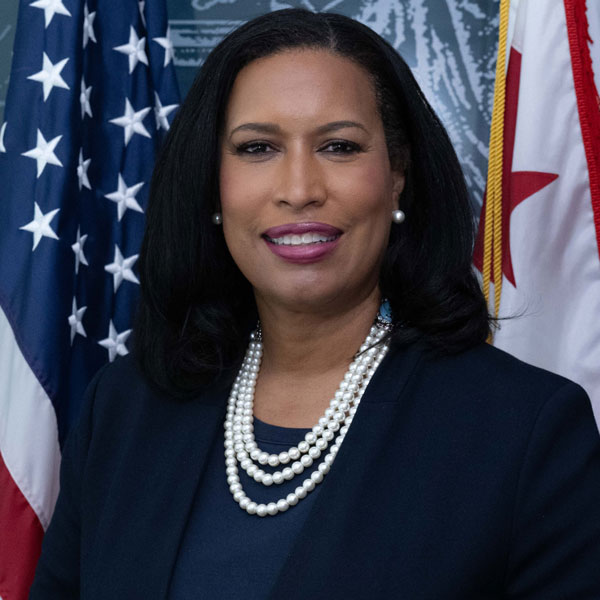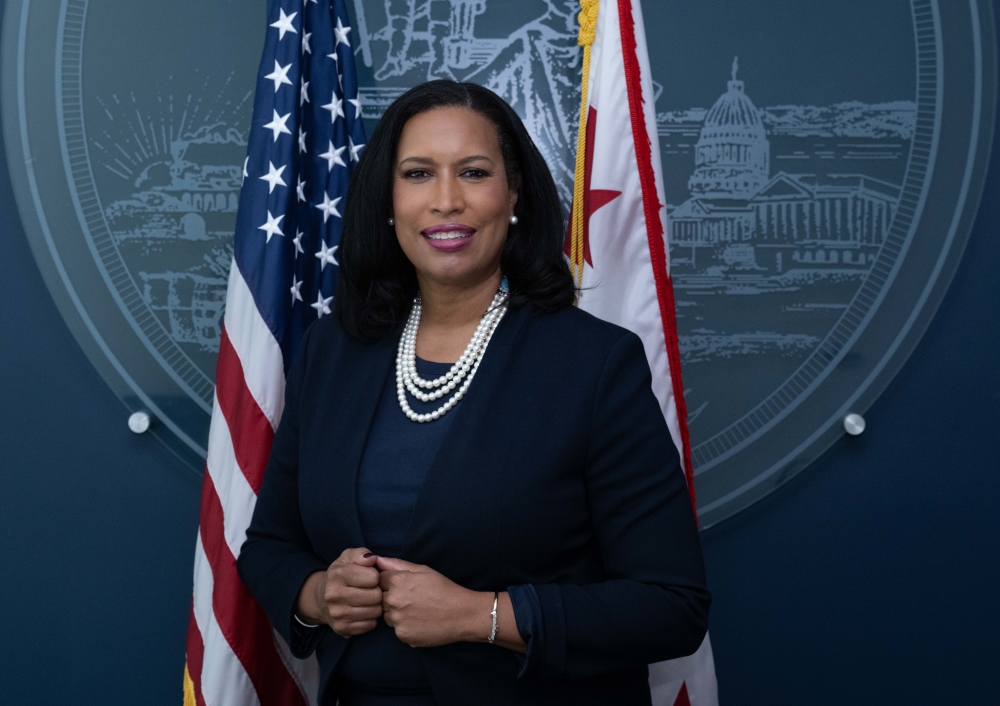Mayor Bowser sets an ambitious agenda and exceeds it.
Any way you look at the track record of Washington, DC Mayor Muriel Bowser, an objective observer must come away with the conclusion that it has been an economic development success.
From landing deals with the Commanders, Capitals, Wizards, Mystics, Washington Spirit and DC United to creating a record number of new housing units in the District, the tenure of Mayor Bowser has been marked by one signature win after another.
In the following in-depth interview, we learn more about how Mayor Bowser accomplished these breakthrough deals and what to expect moving forward for the DC economy.
What are your Administration’s biggest economic development accomplishments to date?
MAYOR BOWSER: I like to say you win by winning — every day, every project, every initiative. Every day, we have to identify what the city needs, what we need to do, and how we can deliver for the residents of the District of Columbia. We set big goals and we set little ones too, and the way we win is to deliver on them every single day.
By taking this approach, we’ve been able to deliver major economic development projects across DC. We’ve unstuck stuck projects and unlocked underutilized land throughout the city, at places like Skyland Town Center, the McMillan Reservoir and the Parks at Walter Reed. I am especially proud of our work in Ward 8, including the transformation of the St. Elizabeths East campus, which now has an arena, housing, retail, educational opportunities and a new hospital.
We are also proud to be the Sports Capital, and we have been very intentional about our investments in sports and entertainment. In just the past decade, we built the CareFirst Arena, which is the home of the Mystics, and Audi Field, which is home to DC United, the Washington Spirit and the DC Defenders. The Capital One Arena, which is home to the Wizards and the Capitals and also hosts many other events and concerts, is currently undergoing a major renovation — and that renovation is an important part of our downtown comeback. And, of course, just this year, we announced an agreement to bring our Commanders home and activate 180 acres of opportunity on the banks of the Anacostia River.
How is your housing initiative going to date? What are the next phases?
MAYOR BOWSER: By investing in housing, we’ve been able to slow the cost of housing, increase the number of families living in affordable housing and stay competitive in the region. Over the past decade, we’ve invested more than $1.5 billion into affordable housing, more per capita than any other jurisdiction in the country. When I came into office, I said we would double our annual investment in our Housing Production Trust Fund to $100 million, and we’ve done that.

“By growing our sports and entertainment industry, we’re creating jobs, giving people more reasons to visit DC, and investing in our entertainment districts.”
— Muriel Bowser, Mayor, Washington DC
I started off my second term with a big goal: to build 36,000 new homes by 2025. We got it done in less than five years. In fact, we’ve built more than 60,000 new housing units in the past 10 years. That increase in our housing supply has helped blunt the rise in housing costs, with average rents in DC increasing at half the national average.
At the start of my third term, we set another housing goal — to add 15,000 residents to our downtown. One of our strategies has been to catalyze the conversion of underutilized office buildings into housing through our Housing in Downtown program. That’s been a very successful program, and just this fall we expanded the area which the program covers. To date, we have 1,700 units in the pipeline.
Through all of this, and especially right now, we’re also focused on making sure we are stabilizing our affordable housing system, making sure we protect our current stock of affordable housing, and making sure we are a place that investors want to invest and build more housing. That’s also part of keeping DC a livable place to call home.
What impact will the various sports stadium projects have on the city?
MAYOR BOWSER: The District has been very successful at leveraging sports investments to unlock neighborhood potential: Capital One Arena in Chinatown-Gallery Place, Nationals Park on the Capital Riverfront, the CareFirst Arena at St. Elizabeths East, and now a partnership with the Washington Commanders to develop 180 acres of land that has sat mostly vacant for far too long. Since building Nationals Park, for example, we’ve added more than 12,000 homes in that neighborhood, dozens of restaurants and bars, and all of that means more jobs and more opportunities for DC residents.
The redevelopment of the RFK campus, anchored by an NFL stadium, will be the largest economic development project in DC history. It will create thousands of jobs for DC residents and generate approximately $4 billion in total tax revenue. The investment that the Commanders are making in the stadium is the single-largest private investment in DC’s history. Right now, the site is mostly a sea of asphalt; but that asphalt will be replaced with housing, parks and green space, retail, hotels, a sportsplex, the best stadium in the NFL, and an entertainment district, all on our beautiful Anacostia waterfront.
We’re also undergoing an $800 million renovation of Capital One Arena, a major investment in the future of Downtown DC. The upgrades will deliver a state-of-the-art fan experience, while generating thousands of jobs and over $1.5 billion in long-term tax revenue.
By growing our sports and entertainment industry, we’re creating jobs, giving people more reasons to visit DC, and investing in our entertainment districts.
Are there any misconceptions about DC that you would like to address and rectify?
MAYOR BOWSER: There’s a common misconception that DC is just a federal city. We’re proud to be the seat of the federal government, but we’re so much more than that. Our city is rich in history, culture, talent and innovation. We have beautiful neighborhoods, the nation’s number one park system five years running, the country’s fastest-improving urban school district, and an outstanding public transportation system. We are home to more than 700,000 people. We’re a leader in tech innovation and cybersecurity talent and have a highly skilled workforce that’s able to take on any challenge. We’re a city of creators, builders and changemakers. We’re also a great place to do business. That’s the real story of DC.

